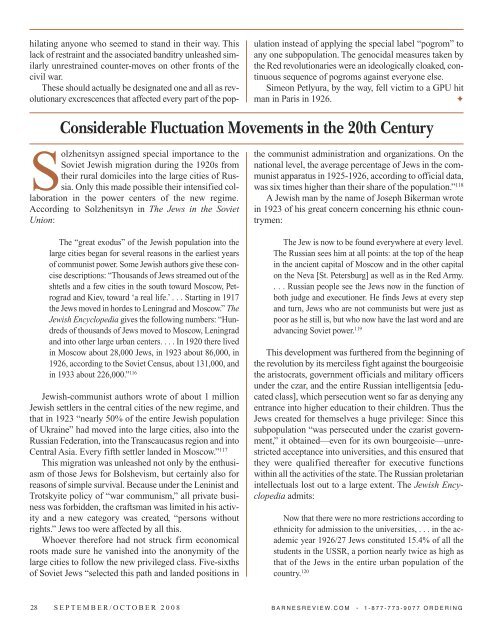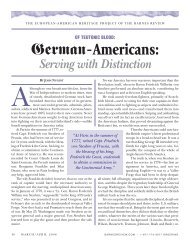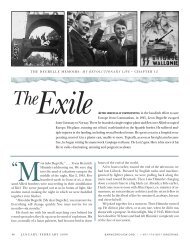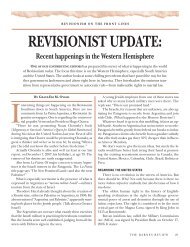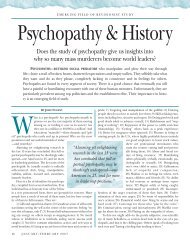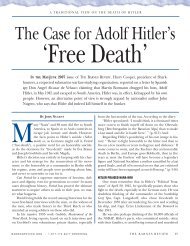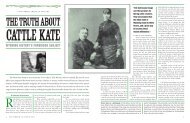Russia and the Jews
Russia and the Jews
Russia and the Jews
Create successful ePaper yourself
Turn your PDF publications into a flip-book with our unique Google optimized e-Paper software.
hilating anyone who seemed to st<strong>and</strong> in <strong>the</strong>ir way. This<br />
lack of restraint <strong>and</strong> <strong>the</strong> associated b<strong>and</strong>itry unleashed similarly<br />
unrestrained counter-moves on o<strong>the</strong>r fronts of <strong>the</strong><br />
civil war.<br />
These should actually be designated one <strong>and</strong> all as revolutionary<br />
excrescences that affected every part of <strong>the</strong> population<br />
instead of applying <strong>the</strong> special label “pogrom” to<br />
any one subpopulation. The genocidal measures taken by<br />
<strong>the</strong> Red revolutionaries were an ideologically cloaked, continuous<br />
sequence of pogroms against everyone else.<br />
Simeon Petlyura, by <strong>the</strong> way, fell victim to a GPU hit<br />
man in Paris in 1926.<br />
✦<br />
Considerable Fluctuation Movements in <strong>the</strong> 20th Century<br />
Solzhenitsyn assigned special importance to <strong>the</strong><br />
Soviet Jewish migration during <strong>the</strong> 1920s from<br />
<strong>the</strong>ir rural domiciles into <strong>the</strong> large cities of <strong>Russia</strong>.<br />
Only this made possible <strong>the</strong>ir intensified collaboration<br />
in <strong>the</strong> power centers of <strong>the</strong> new regime.<br />
According to Solzhenitsyn in The <strong>Jews</strong> in <strong>the</strong> Soviet<br />
Union:<br />
The “great exodus” of <strong>the</strong> Jewish population into <strong>the</strong><br />
large cities began for several reasons in <strong>the</strong> earliest years<br />
of communist power. Some Jewish authors give <strong>the</strong>se concise<br />
descriptions: “Thous<strong>and</strong>s of <strong>Jews</strong> streamed out of <strong>the</strong><br />
shtetls <strong>and</strong> a few cities in <strong>the</strong> south toward Moscow, Petrograd<br />
<strong>and</strong> Kiev, toward ‘a real life.’ . . . Starting in 1917<br />
<strong>the</strong> <strong>Jews</strong> moved in hordes to Leningrad <strong>and</strong> Moscow.” The<br />
Jewish Encyclopedia gives <strong>the</strong> following numbers: “Hundreds<br />
of thous<strong>and</strong>s of <strong>Jews</strong> moved to Moscow, Leningrad<br />
<strong>and</strong> into o<strong>the</strong>r large urban centers. . . . In 1920 <strong>the</strong>re lived<br />
in Moscow about 28,000 <strong>Jews</strong>, in 1923 about 86,000, in<br />
1926, according to <strong>the</strong> Soviet Census, about 131,000, <strong>and</strong><br />
in 1933 about 226,000.” 116<br />
Jewish-communist authors wrote of about 1 million<br />
Jewish settlers in <strong>the</strong> central cities of <strong>the</strong> new regime, <strong>and</strong><br />
that in 1923 “nearly 50% of <strong>the</strong> entire Jewish population<br />
of Ukraine” had moved into <strong>the</strong> large cities, also into <strong>the</strong><br />
<strong>Russia</strong>n Federation, into <strong>the</strong> Transcaucasus region <strong>and</strong> into<br />
Central Asia. Every fifth settler l<strong>and</strong>ed in Moscow.” 117<br />
This migration was unleashed not only by <strong>the</strong> enthusiasm<br />
of those <strong>Jews</strong> for Bolshevism, but certainly also for<br />
reasons of simple survival. Because under <strong>the</strong> Leninist <strong>and</strong><br />
Trotskyite policy of “war communism,” all private business<br />
was forbidden, <strong>the</strong> craftsman was limited in his activity<br />
<strong>and</strong> a new category was created, “persons without<br />
rights.” <strong>Jews</strong> too were affected by all this.<br />
Whoever <strong>the</strong>refore had not struck firm economical<br />
roots made sure he vanished into <strong>the</strong> anonymity of <strong>the</strong><br />
large cities to follow <strong>the</strong> new privileged class. Five-sixths<br />
of Soviet <strong>Jews</strong> “selected this path <strong>and</strong> l<strong>and</strong>ed positions in<br />
<strong>the</strong> communist administration <strong>and</strong> organizations. On <strong>the</strong><br />
national level, <strong>the</strong> average percentage of <strong>Jews</strong> in <strong>the</strong> communist<br />
apparatus in 1925-1926, according to official data,<br />
was six times higher than <strong>the</strong>ir share of <strong>the</strong> population.” 118<br />
A Jewish man by <strong>the</strong> name of Joseph Bikerman wrote<br />
in 1923 of his great concern concerning his ethnic countrymen:<br />
The Jew is now to be found everywhere at every level.<br />
The <strong>Russia</strong>n sees him at all points: at <strong>the</strong> top of <strong>the</strong> heap<br />
in <strong>the</strong> ancient capital of Moscow <strong>and</strong> in <strong>the</strong> o<strong>the</strong>r capital<br />
on <strong>the</strong> Neva [St. Petersburg] as well as in <strong>the</strong> Red Army.<br />
. . . <strong>Russia</strong>n people see <strong>the</strong> <strong>Jews</strong> now in <strong>the</strong> function of<br />
both judge <strong>and</strong> executioner. He finds <strong>Jews</strong> at every step<br />
<strong>and</strong> turn, <strong>Jews</strong> who are not communists but were just as<br />
poor as he still is, but who now have <strong>the</strong> last word <strong>and</strong> are<br />
advancing Soviet power. 119<br />
This development was fur<strong>the</strong>red from <strong>the</strong> beginning of<br />
<strong>the</strong> revolution by its merciless fight against <strong>the</strong> bourgeoisie<br />
<strong>the</strong> aristocrats, government officials <strong>and</strong> military officers<br />
under <strong>the</strong> czar, <strong>and</strong> <strong>the</strong> entire <strong>Russia</strong>n intelligentsia [educated<br />
class], which persecution went so far as denying any<br />
entrance into higher education to <strong>the</strong>ir children. Thus <strong>the</strong><br />
<strong>Jews</strong> created for <strong>the</strong>mselves a huge privilege: Since this<br />
subpopulation “was persecuted under <strong>the</strong> czarist government,”<br />
it obtained—even for its own bourgeoisie—unrestricted<br />
acceptance into universities, <strong>and</strong> this ensured that<br />
<strong>the</strong>y were qualified <strong>the</strong>reafter for executive functions<br />
within all <strong>the</strong> activities of <strong>the</strong> state. The <strong>Russia</strong>n proletarian<br />
intellectuals lost out to a large extent. The Jewish Encyclopedia<br />
admits:<br />
Now that <strong>the</strong>re were no more restrictions according to<br />
ethnicity for admission to <strong>the</strong> universities, . . . in <strong>the</strong> academic<br />
year 1926/27 <strong>Jews</strong> constituted 15.4% of all <strong>the</strong><br />
students in <strong>the</strong> USSR, a portion nearly twice as high as<br />
that of <strong>the</strong> <strong>Jews</strong> in <strong>the</strong> entire urban population of <strong>the</strong><br />
country. 120<br />
28 S E P T E M B E R / O C T O B E R 2 0 0 8 B A R N E S R E V I E W . C O M • 1 - 8 7 7 - 7 7 3 - 9 0 7 7 O R D E R I N G


